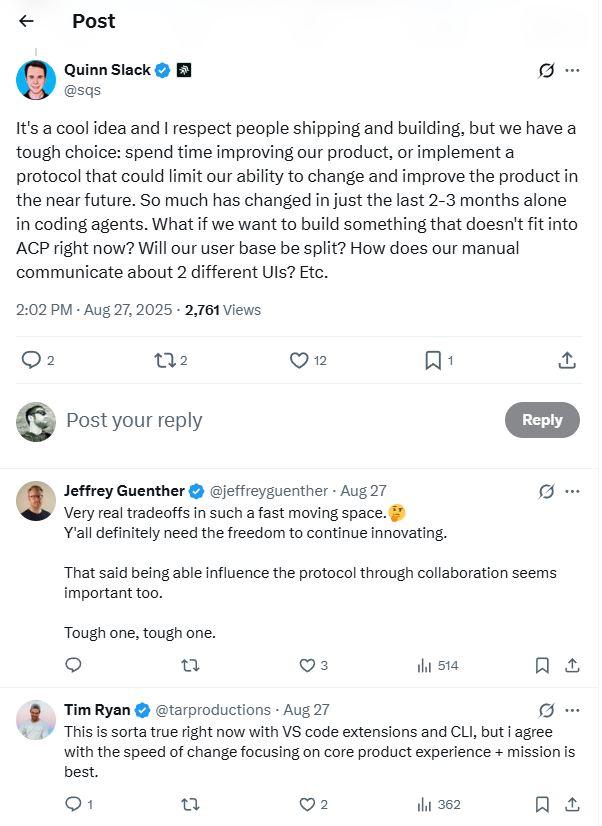
23 Oct 20257 minute read

23 Oct 20257 minute read

When Zed, creators of the eponymous open source code editor, debuted the Agent Client Protocol (ACP) a couple of months back, its intent was clear: to build a universal bridge between AI coding agents and development environments — a way for any agent to plug into any editor, without bespoke integration work. It had a notable co-signator on board, too, in the form of Google, which built an ACP-compatible version of its Gemini CLI to demonstrate the protocol in action.
But for any standard to gain meaningful traction, it needs real adoption and collaboration from across the technological spectrum. And that’s where JetBrains comes in.
JetBrains recently announced that it’s partnering with Zed to co-develop and adopt the Agent Client Protocol, bringing native ACP support to its suite of IDEs — including IntelliJ IDEA, PyCharm, and WebStorm. The move will make JetBrains environments interoperable with any AI coding agent that speaks the protocol, allowing developers to work with their preferred agent rather than being tied to the IDE’s own assistant.
Anyone who’s spent time in software development will know JetBrains as one of the cornerstones of the IDE landscape — a company that, for more than two decades, has defined what a “complete” development environment looks like. Its decision to join the ACP effort marks the first time one of the major, established vendors has thrown its full weight behind the idea of open interoperability between coding agents and editors.
In its announcement, JetBrains describes ACP as the foundation for a new kind of AI integration: one where the IDE itself mediates the agent’s access to code, terminals, and project tools, while keeping developers firmly in control. It’s an attempt to make external agents feel native to the IDE experience, preserving familiar workflows like diff previews and inline edits, without handing over too much autonomy.
“Going forward, your IDE will mediate access to files, the terminal, and other tools via the ACP protocol — you decide what runs,” Denis Shiryaev, a product manager at JetBrains, said. “The result is agents that are portable, powerful, and predictable inside your daily tools.”
Zed, for its part, said that JetBrains had already been exploring how to standardize agent support across its IDEs for its own agent, Junie, as well as others like Codex and Gemini CLI.
“After meeting with us, they decided ACP was the right approach and we’re excited to have them on board,” Franciska Dethlefsen, Zed’s head of marketing and growth, wrote.
While Zed had already secured early ACP support from Google, JetBrains’ participation could prove pivotal for pushing the protocol into mainstream developer workflows.
For Anthropic’s Claude Code, the Zed team had to build a custom wrapper themselves — a sign of how fragmented the landscape still is. And last week, Zed announced that OpenAI’s coding agent Codex is also now live inside Zed, thanks to an adapter the company built to make the model speak ACP. Now, Zed is calling on the wider ecosystem to join in. The company urged developers and users to push their favourite agent makers to adopt ACP, arguing that JetBrains’ involvement proves the protocol has reached critical mass.
“We’re serious about making ACP the standard for agent-editor integration,” said Dethlefsen. “We want every agent working in every compatible editor. And JetBrains is proof that this vision is becoming reality.”
Zed is even directing ACP advocates to specific channels, including GitHub issues and social networks, where they can “make their opinions heard.” Indeed, while it’s clear that ACP is gaining traction, there are still some doubters out there.
For instance, Quinn Slack, CEO of Sourcegraph, which develops the AMP coding agent, said that adopting ACP too early could slow innovation in such a fast-moving space. “It’s a cool idea and I respect people shipping and building,” he wrote. “But we have a tough choice: spend time improving our product, or implement a protocol that could limit our ability to change and improve the product in the near future.”
Others chimed in, agreeing that it’s a genuine trade-off in a field moving as quickly as AI-assisted coding.

Over on the VS Code GitHub repository, meanwhile, Microsoft engineer Rob Laurens struck a similar tone. Responding to a discussion about ACP, he called the idea “interesting” but said he didn’t plan to implement it right away, noting that the team is focused on a deep integration with Anthropic’s Claude Code and that “not everything their SDK offers is available via ACP.”
“I'll keep an eye on it, and when we get to support for Gemini CLI then we will end up with some level of support for it by default anyway,” Laurens wrote, referencing Google’s Gemini agent that already works with ACP inside Zed.
However, with JetBrains now in the mix, ACP’s path toward becoming a true industry standard looks more credible than ever. The company’s involvement gives the protocol both scale and legitimacy — a bridge between experimental tools and established ecosystems. Whether other major players follow suit remains to be seen, but if they do, the future of AI-assisted development may hinge less on which editor you use and more on which agent you choose to bring inside it.